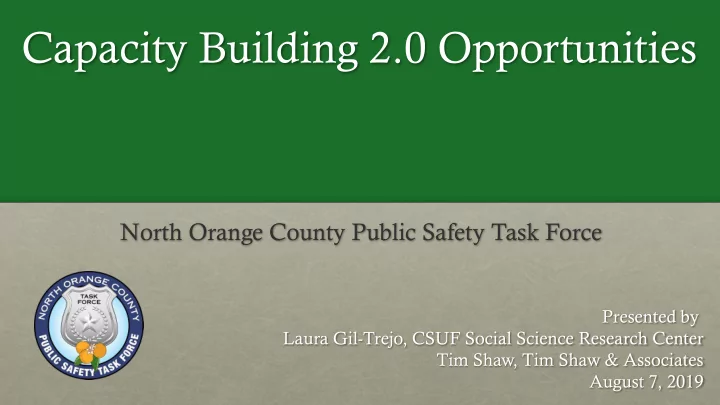

Capacity Building 2.0 Opportunities North Orange County Public Safety Task Force Presented by Laura Gil-Trejo, CSUF Social Science Research Center Tim Shaw, Tim Shaw & Associates August 7, 2019
Why capacity building?
“Capacity building is whatever is needed to bring a nonprofit to the next level of operational, programmatic, financial, or organizational maturity, so it may more effectively and efficiently advance its mission into the future. Capacity building is not a one-time effort to improve short-term effectiveness, but a continuous improvement strategy toward the creation of a sustainable and effective organization.” – National Council of Nonprofits
“Among all the forces affecting program implementation and survival, organizational factors have received little attention. Yet, programs are not the same as organizations. Research suggests that organizational factors are intricately tied to their ability to effectively implement new programs or expand existing programs” Schuh & Levington, 2006
Today’s Objectives • Present insights from the evaluations and survey of CBOs participating in Capacity Building Workshops in 2018/19. • Present Capacity Building 2.0 plan and schedule. • Process for registration in Peer Learning Cohorts.
Workshop Evaluation Results
workshops • Grant-winning • Marketing & Branding • Strategic Visioning • Program Evaluation • Funding & Revenue Models • Project & Task Management • Operations/Implementation • Effective Collaboration Planning • Board Building & Engagement
Evaluation Results • None under 3.6 out 4: Value, Relevance, Likely to Recommend, Likely to Apply Learning, Good Use of Time • Value of workshops: • High: Marketing (4) • Low: Grant-winning (3.77)
Evaluation Results • How Likely to Apply What you Learned: • High: Funding (3.78) • Low: Strategic Visioning (3.68)
Workshop evaluation results 5.3% N = 19 “Has the functioning, effectiveness, operations, strategy, or planning of your organization improved as a result of what you learned in one or more of the capacity building 94.7% workshops sponsored by NOC?” N = 15 Yes No “Has your organization 26.7% implemented any of the strategies presented at one or more of the NOC supported workshops?” 73.3%
Workshop evaluation results 80% 76.0% 69.0% 70% 61.5% 60% 50% 44.7% 40.6% 40% 34.4% 30% 25.9% 20.3% 19.1% 20% 10.4% 10% 0% Strategic Planning Board Development Evaluation Collaboration Funding Model Made Changes Change Because of Workshop
Workshop evaluation results Change in Collaboration by Workshop Attendance 50% 46.7% 45% 40.0% 40% 35% 30% 25% 20% 16.7% 15% 10% 5% 0.0% 0% Did your agency make changes in its collaboration methods/approaches Did your organization make any changes in its collaborative relationships during the last 12 months? during the past 12 months? Attended Collaboration Workshop Did not Attend Collaboration Workshop
Workshop evaluation results What topics would your organization be most interested in if the Task Force were to support Peer Learning Communities in Year 3? Project management 62.5% Marketing 62.5% Strategic visioning 58.3% Collaboration 58.3% Program evaluation 58.3% Board development 54.2% Grant-winning strategies 54.2% Developing a funding model 50.0% 30% 35% 40% 45% 50% 55% 60% 65%
Resources Available • Templates and Samples • Live video recording • Links to on-line resources • 1:1 mentoring (upon approval by Soo)
capacity building 2.0!
Project Management • Train-the-Trainer Model • Include city Community Services Departments/PDs • One rep from each CBO/PD/CSD • Initial workshop with follow-up session
Evaluation Peer Learning Cohort 1 • Up to 8 participants • 3 months • Each participant receives 2 hours of individual consulting outside of group • Must have attended Evaluation workshop
Board Strengthening Peer Learning Cohort 1 • Up to 8 participants • 3 months • Each participant receives 2 hours of individual consulting outside of group • Must have participated in Board Strengthening workshop • Must commit to organization engaging in Board strengthening process
Strategic Visioning/Planning Peer Learning Cohort 1 • Up to 5 participants • 6 months • Each participant receives 4 hours of individual consulting outside of group • Must have attended Strategic Visioning workshop • Must commit organization to strategic planning process • iCat
Collaboration Symposium • Half-day w/social hour • Guest speaker and panel discussions • Model programs • “Speed - dating” • City PDs and CSDs included
Schedule • Project Management Train-the Trainer Workshop: September 10, 8 – 10 AM, Buena Park Community Center • Evaluation Peer Learning Cohort 1: September 2019 – November 2019 • Board Strengthening Peer Learning Cohort 1: September 2019 – November 2019 • Strategic Visioning/Planning PL Cohort 1: September 2019 – February 2020 • Collaboration Symposium: March/April 2020
Q & A
Thank you!
Recommend
More recommend